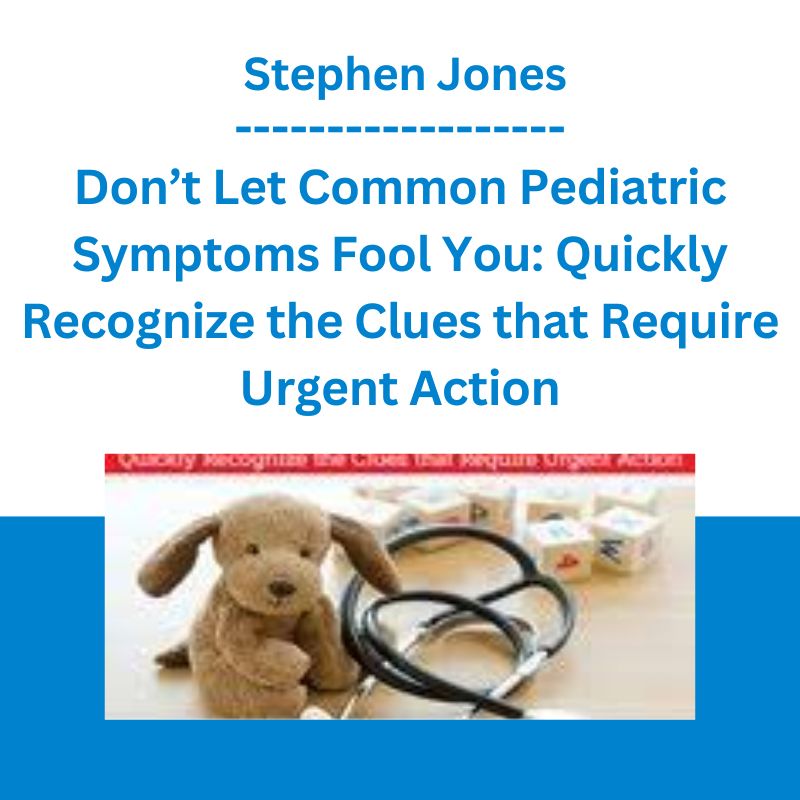*** Proof of Product ***

Exploring the Essential Features of “Don’t Let Common Pediatric Symptoms Fool You: Quickly Recognize the Clues that Require Urgent Action – Stephen Jones”
Don’t Let Common Pediatric Symptoms Fool You: Quickly Recognize the Clues that Require Urgent Action
Speaker: Stephen Jones, MS, RN, PNP, ET
Duration: 6 Hours 36 Minutes
Format: Audio and Video
Description
Children are not small adults, and infants are not small children. Each are unique and require different interventions and treatment modalities. It is imperative that nurses and other healthcare providers in all health care settings – from home to primary to acute care – be prepared to identify and intervene as early as possible with respiratory situations, GI-related conditions, and two of the major maladies of childhood: fever and diarrhea.
As pediatric healthcare providers, it is essential that we grasp and understand the underlying causes of these pediatric clinical challenges. Secondary to both anatomical and physiological etiologies, children with these conditions may present with acute illnesses, flare-ups of chronic conditions or life-threatening complications.
The pediatric patient can present with a myriad of causes contributing to their unexplainable symptoms. Does this sound familiar… Your patient’s parents report increasing symptoms over the past 7 to 10 days. He’s “always been a good sleeper” but his sleep has been impacted now. The little guy is experiencing recurrent fevers, and is seemingly unresponsive to anti-pyretics. He appears restless, “not himself”, and his appetite and fluid intake have been less. While his asthma had been “stable”, he seems to be manifesting increasing symptoms and the albuterol is not helping with the wet cough and is making him gag and “vomit”. Could this case turn south? And how quickly could that happen?
Over the course of this recording, you will learn practical strategies to integrate symptomology and appropriate diagnostics into your differential diagnosis. You will gain an enhanced ability to pinpoint etiology by understanding the inter-relationship of signs/symptoms with new differentiation skills to know when to treat the “cause” versus the “symptom”. You will leave able to intervene quickly and appropriately for the young patients trusted to your care!
Speaker
Stephen Jones, MS, RN, PNP, ET
Stephen Jones, MS, RN, PNP, ET, is a fulltime Pediatric Clinical Nurse Specialist/Nurse Practitioner and Enterostomal Therapist, practicing at The Children’s Hospital @ Albany Medical Center in Albany, NY. In this multidimensional role, Stephen covers all inpatient pediatric units, including the PICU, as well as the pediatric Pulmonary & Cystic Fibrosis clinic. As an Enterostomal Therapist specializing in infants and children, Steve serves as a resource and consultant around the country. He has published articles in numerous nursing journals, authored chapters in several pediatric textbooks, and presented posters at numerous national conferences. Steve was instrumental in establishing the original pediatric transport team, pediatric critical care courses and pediatric core curriculum at his hospital, and initiation of the pediatric PICC program. In addition to his active and busy clinical practice, he is also the founder and principal of Pediatric Concepts, a company dedicated to providing quality educational programs for healthcare professionals.
Stephen has focused his nursing career entirely in pediatrics, previously serving in various staff positions within the PICU and general pediatric units. He continues to be active in all arenas of pediatric nursing, as well as a member of his local state NP association. Stephen holds undergraduate degrees from Union College and Skidmore College, while his graduate degree is from the University of Rochester. He has been on and continues to participate via speakers bureaus for a variety of pharmaceutical companies and continues to lecture extensively to a diverse audience through North America, including healthcare professionals, as well as parents and families. Steve’s long-standing passion for optimal and evidence-based pediatric care will be evident throughout this presentation. You will find him to be practical, informative, entertaining and motivating.
Speaker Disclosures:
Financial: Stephen Jones is the founder of Pediatric Concepts and has a employment relationship with The Children’s Hospital – Albany Medical Center, Albany Medical College and Russell Sage College. He receives a speaker honorarium from Chiesi USA. He on the advisory board of Chiesi, Novartis, Genentech, Mylan. Stephen Jones receives a speaking honorarium and recording royalties from PESI, Inc. All relevant financial relationships with ineligible organizations have been mitigated.
Non-Financial: Stephen Jones is a member of The Nurse Practitioner Association of New York State.
Objectives
- Explain the appropriate utilization of various technologies used with respiratory conditions and their clinical significance.
- Recommend appropriate interventions for the child manifesting either an upper or lower respiratory condition.
- Determine the essentials necessary for an efficient and comprehensive gastrointestinal assessment and management plan as it relates to the “zones”.
- Analyze the impact of inappropriate diet and nutrition on the pediatric GI Tract.
- Evaluate both the pharmacological and nonpharmacological management of selected non-surgical
- GI conditions: diarrhea, vomiting, constipation, and “spitting up”.
- Examine the underlying causes and triggers of temperature dysregulation in determining appropriate evidence-based treatment.
- Contrast between causes and symptoms for the child experiencing dehydration and/or diarrhea.
Outline
Assessment: Advanced Skills for Pediatric History-Taking and Physical Assessment
- Developmentally- and age-appropriate techniques for assessment
- Determining cause versus symptom – and underlying triggers
- Non-pharmacological and pharmacological choices
- Laboratory values: System-specific and significance to underlying condition
Best Responses to Early Signs of Acute Respiratory Changes: Recognize and Respond to Early Signs of Distress
- “5 fingered assessment”
- Non-pharmacological: Oxygen therapy, mist/humidification, airway clearance, pulse oximeter, technologies to deliver medications
- Pharmacological choices: OTC versus prescription antimicrobials, “RAD/asthma”, and “cold & cough”
- Apnea: Central and obstructive
- Upper respiratory/ENT conditions: Sinusitis, tonsillitis, croup, laryngomalacia
- Lower respiratory conditions: Infectious (bronchiolitis/RSV and HMV; pneumonia) and anatomical (asthma)
Solve the Complexities of the Pediatric GI Tract
- GI physical examination: Differentiating the “zones” of the GI tract and their functions
- What about the hygiene hypothesis
- Diet and nutrition components: Vitamins, minerals, electrolytes, probiotics
- Underlying triggers: Environmental, infectious, anatomical
- Pharmacological and non-pharmacological management: “Spitting up”, GER and “sensitivities”, colic, constipation
Fever, Temperature and Diarrhea in Children: Avoid the Mis-management Mistakes
- History-taking and physical assessment strategies
- Non-pharmacological and pharmacological: Antimicrobials, antipyretics, anti-diarrheal
- Temperature measurement: Pathophysiology of fever versus hyperthermia and “fever phobia”
- Dehydration: Concepts of fluid and electrolyte management and tonicity
- Diarrhea: Pathophysiology and evidence-based management guidelines (enteral and parenteral)
Target Audience
- Nurses
- School Nurses
- Public Health Nurses
- Nurse Practitioners
- Clinical Nurse Specialists
- Physician Assistants
- Day Care Providers
Please see the full list of alternative group-buy courses available here: https://lunacourse.com/shop/










 David Baldacci - MasterClass - Teaches Mystery and Thriller Writing
David Baldacci - MasterClass - Teaches Mystery and Thriller Writing